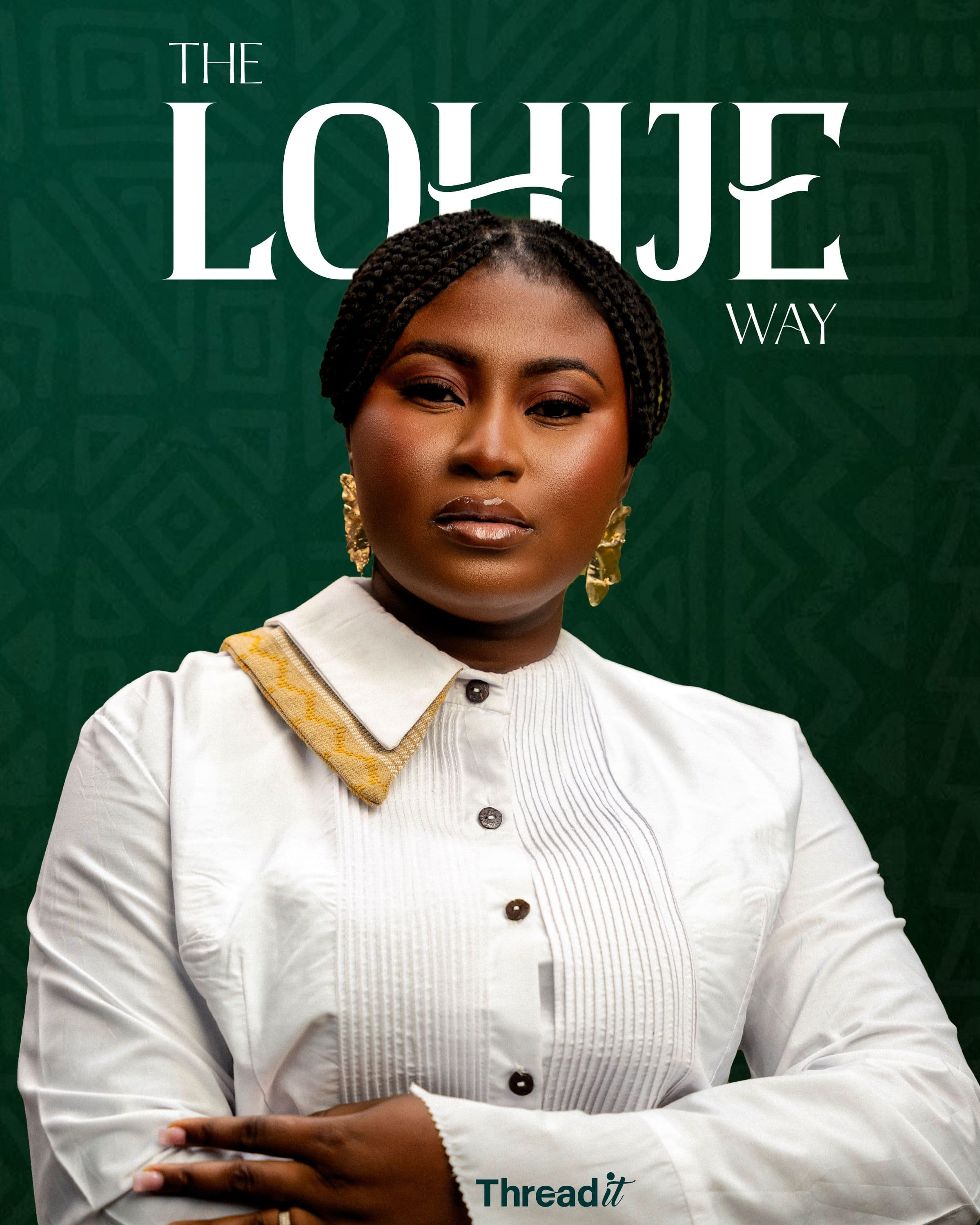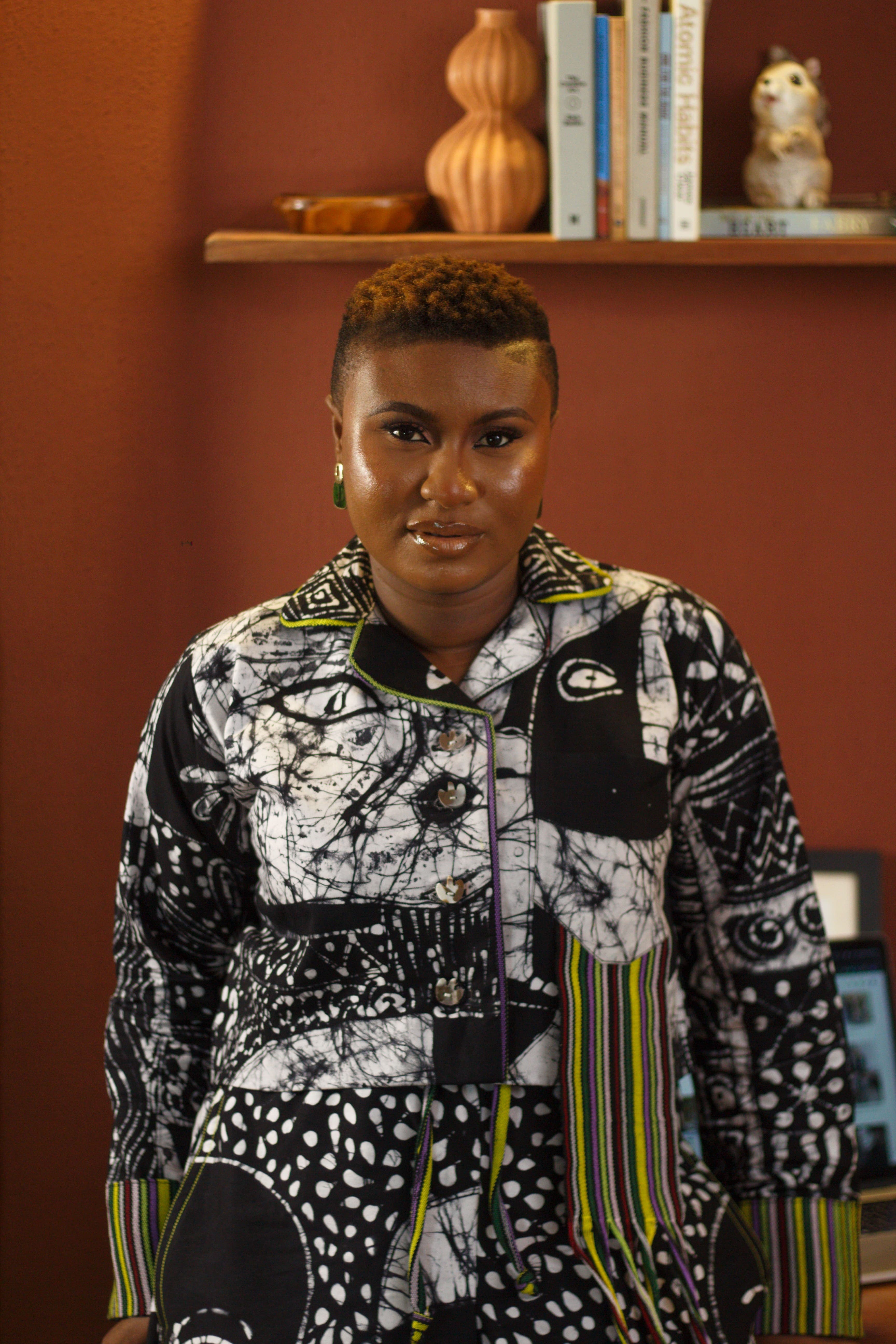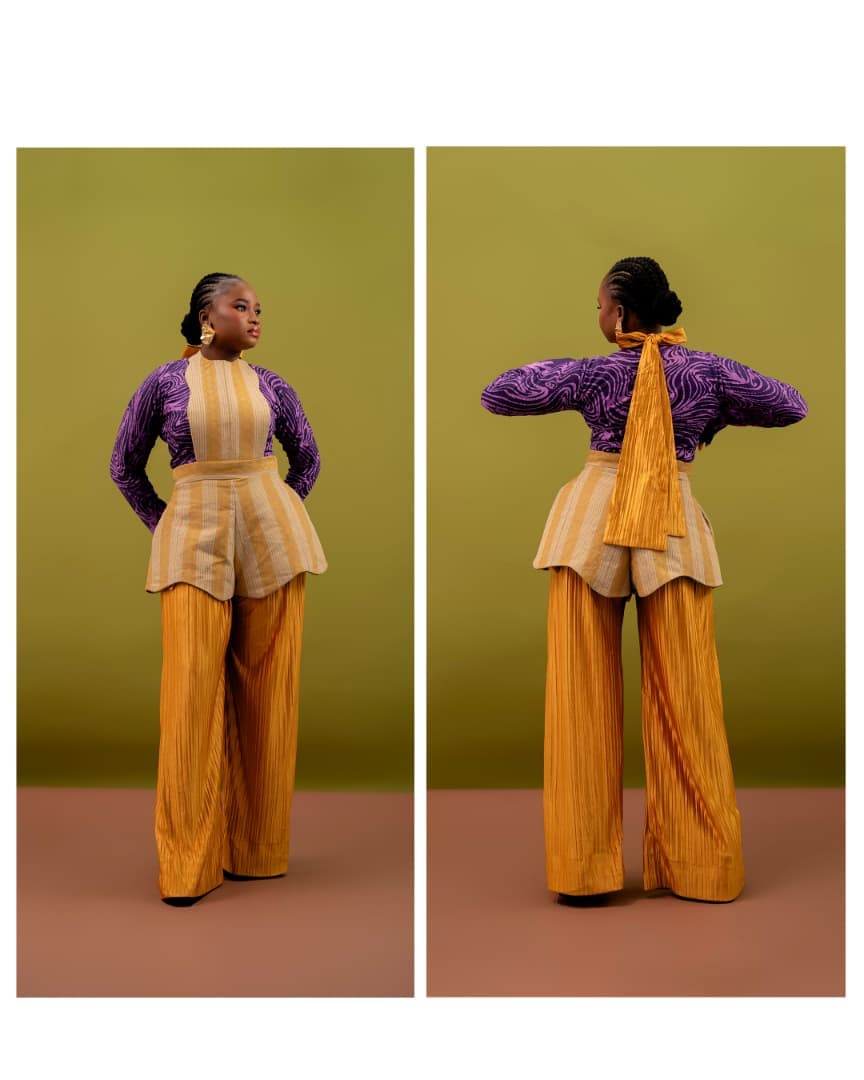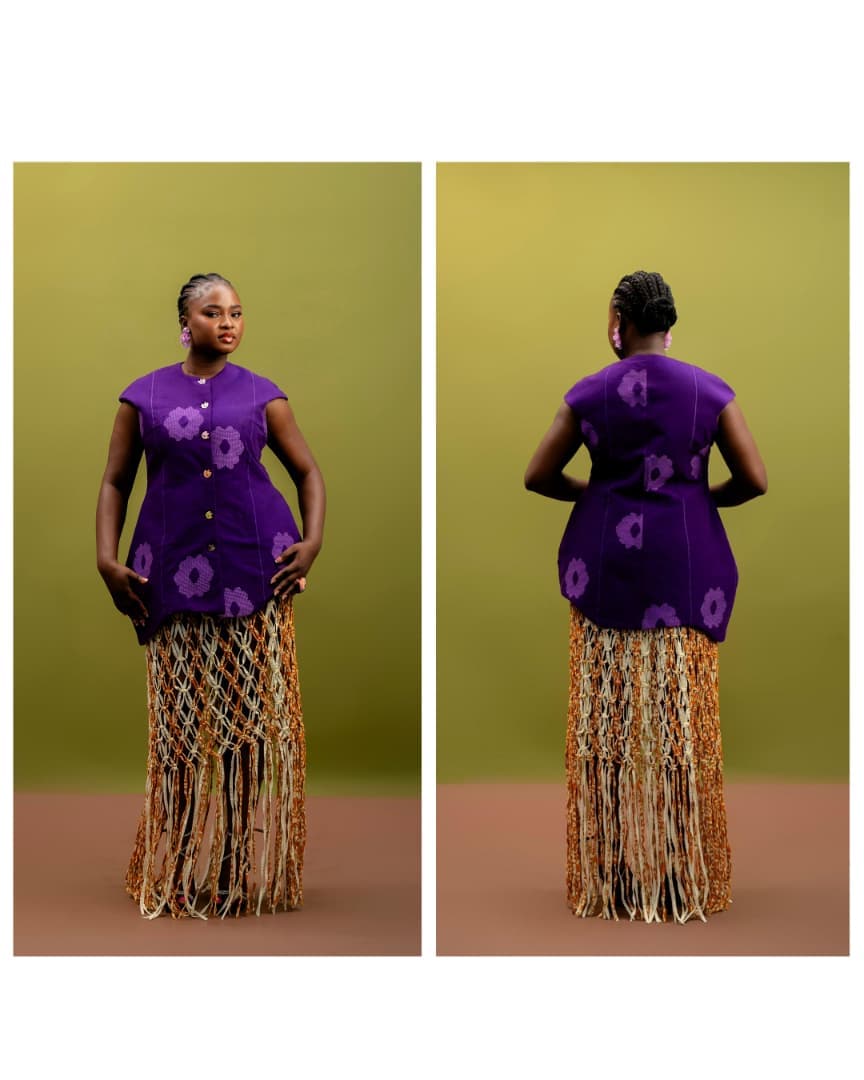Sustainability for Fashion Brands
10 mins read
The Lohije Way: Gift Olohije on Fashioning Sustainability and Self-Expression
By Sybil Fekurumoh
August 14, 2025
Eco-fashion designer Gift Olohije, founder of Lohije, blends African tradition with modern style, staying true to her sustainable fashion values.

Gift Oholije is the founder of Lohije, an eco-conscious fashion brand in Nigeria | Lohije
Nothing was set in stone when Gift Olohije Raji began her sustainable fashion brand, Lohije, in 2021. However, what was certain was that she wanted to build a brand that leans toward the unconventional. A brand that embraces ethical fashion for the sake of cultural preservation and as a moral obligation to the environment.
You may find a Lohije outfit that has coconut shells for buttons, or another made from both Adire and Aso-Oke; it is all intentional. Olohije and I catch up via a virtual meeting. The meeting itself is hard-won — delayed several times — but as it happens, it is sharp and spirited. We discuss her passion for sustainability, the strides she has made in operating a fashion business within Nigeria’s economic landscape, and what inspires her juxtaposition of tradition and modernity, especially in her latest collection, Metamorphosis II.
As a designer and sustainability advocate, she leverages the digital channels at her disposal, and she has emerged as one of Nigeria’s successful sustainable fashion designers.
“I’ve used my platform to share societal issues and the environmental impact of fast fashion. People who have my WhatsApp contact know that I am a preacher for sustainable fashion,” she tells me.
The impact of digital media cannot be overstated. Globally, sustainable fashion has gained significant coverage on the internet since the 2010s, coinciding with the rise of conscious consumerism, despite the presence of environmental awareness in the fashion industry since the 1960s and 1970s.

Eco-conscious, Gift Olohije uses her digital platforms to advocate for ethical fashion | Lohije.
It Takes a Community
For Lohije, among the many challenges with running any business (operational costs, funding, and so on), one of the toughest was starting. Save for a few Nigerian brands, there weren’t many labels with blueprints rooted in circular fashion. The resources were scarce, and the audience was even scarcer. Olohije had to position her eponymous brand as a distinct fashion house, etching its name into the global fashion industry, while advocating for ethical fashion in a way that is neither critical nor patronising.
For Olohije, there is no small platform, and consistency is the engine that drives her passion. So, whether it was her private contact list or on her Instagram stories and livestreams, she shared information about the fashion industry and the environment. “It was first having to teach people why you're doing what you're doing,” emphasising the need to advocate for a more eco-friendly approach to fashion. “There is also an understanding that I am building, and I am willing to build slowly. And that keeps me going,” She tells me.
It also seems impractical to capture the entire market all at once, which is why having a strong community that understands and values sustainability is important. Olohije understands this logic and capitalises on it. In most of the videos she shares on her Instagram, she begins with the greeting, “Hi, good people,” as if to speak directly to an eco-conscious audience.
With Lohije, the journey is a steady ascent towards becoming a recognised eco-friendly brand in the country, as the founder counts her success with the staunch community she has built around her brand.
As our discussion deepens, she admits, “I want to break even, and I want everybody to know about me. But I have an understanding that what I'm building will take time, and I want Lohije to be beyond me, to live even after I am gone.”
Olohije has become an authority in the field, making appearances on several other platforms to speak about climate change, eco-consciousness, and the business of sustainable fashion, and more recently, appeared as a judge for the Design for the Future competition hosted by Fashions Finest Africa Events. She won the Fashionomics Africa Contest in 2022, as well as being a finalist for Green Access at the Lagos Fashion Week in 2021. Her designs have appeared across runways and popped up in collaborations locally and internationally, including in Seoul, while also having her outfits worn by celebrities such as acclaimed writer Chimamanda Ngozi Adichie and actress Shaffy Bello.

Front and back view of the Maiyya jumpsuit from the brand | Lohije.
Collaboration as an Art Form
In many ways, African apparel making has always been rooted in sustainability, giving credence to both environmental and socio-economic considerations. Take Aso-Oke, Akwete, or Adire cloth-making systems that use organic materials and traditional techniques in one form or the other. Lohije has cast itself as a convergence for indigenous and popular culture, and there is a zero-waste policy at Lohije. All fabrics used during production are either sourced locally or are upcycled materials.
As artisanal production systems face a decline, Lohije celebrates indigenous communities that make fabrics, working with artisans from several Nigerian communities, such as weavers in western Nigeria, who make the Aso-oke and Adire fabric, as well as Sakala material makers from the north.
“It's very important in Africa to celebrate artisan communities, as they were like our first touch, our first introduction to sustainable fashion,” Olohije explains.
For Lohije, it is about bridging the gap between traditional cloth-makers and perhaps educating the newer generation about the need for cultural preservation and longevity.
We should be responsible, she says, “If you go back in time, you notice that wherever you want to claim that Africa was sustainable, it was in the hands of these craftsmen. It must always be that as we try to create with technology now, we never forget those who were our first touch to sustainable fashion, even when they didn't know what sustainable fashion meant.”
This collaboration is an art form in itself, one that is not limited to just indigenous artisans, but with other designers.
As she explains, we must synergise, “We need each other to connect, to rub minds, to inspire one another, and create something unique to all of us. And in sustainable fashion or the future of fashion, it will encourage us to keep going, because we do not have everything set for us like in other countries.”

From the latest collection, the Fura jacket on Labari skirt | Lohije.
To Be Conscious, Yet Stylish
There is a clear throughline between her mother’s resourcefulness as a seamstress who upcycled offcuts to create unique styles, and her father’s appreciation for African art and music, to her experimental approach to fashion.
She draws inspiration from personal and familial experiences, yet pays obeisance to the resilience of artisanal weavers and fabric makers. Olohije is also influenced by avant-garde artists like Nkwo, Duro Olowu, and Daniel Roseberry, and perhaps unsurprisingly, by ancient African architecture.
Like with the structures of the past, Olohije’s work shows a precision with symmetry and a deliberate orientation of both the outfits and the materials used to create them.
She looks at architecture as a strong historical point, “I know that old African architecture was very extravagant. You see women painting on the walls and bricks that were made in repeated shapes and forms, but with very unique patterns.”
But there’s also a fluid twist that makes space for her self-expression. Take the signature Adeola trousers, for example. They play on the look of ripped denim with their jagged edges, but instead of the usual front tear, she uses Aso-oke and rips them laterally.
Olohije explains her expressionism to be partly an affinity for exaggeration and elegance, a way to flatter the human form with her clothes.
“My pieces can be very structural at times, because I love to exaggerate. I'm intrigued about using that to flatter the body, the sleeves more exaggerated, the body more elevated. It's just something that I like to play around with now.”
It’s no surprise, then, that the Wuta top is a one-collar shirt with exaggerated sleeves, or that the Adun jacket is a two-tone, sleeveless piece with a bold posterior cut-out.
Again, as with ancient architecture, her collections are designed to be in tune with nature, using structure and storytelling to express transcendental symbolism. The debut Adamah (From Earth) collection in 2021 used Adire to depict life, earth, and communality in West Africa.
Metamorphosis II
The latest collection, Metamorphosis II, uses the life cycle of the butterfly to make parallels to humans at different stages of growth. As she reveals, a halt in growth is not necessarily the end, but an opportunity to morph into a different and perhaps a better version of oneself.
Butterfly motifs appear throughout Metamorphosis II, with pieces that seem to flutter or take flight.
As she puts it more vividly, “As humans, sometimes we get to a stage that is not so beautiful because we get older. It’s like all the opportunities have been given out, and so there's no seat for us at the table. I tried to present the butterfly, showing how the end stage of the butterfly is more beautiful than the beginning. That you don't have to determine your life by age. The same way the butterfly bloomed from the egg and larva stage is the same way you can bloom in your 30s, 40s, or 50s, especially now that you have more knowledge and experience about life.”
Olohije’s passion seeps through in her creations as she continues to make pieces that stay true to her originality and are less about trend or popularity. Rather than chase visibility, Olohije’s process is grounded in self-awareness.
She speaks to this with clarity and conviction: “Believe in yourself enough that what you have experienced can give you a unique experience, a unique view of life that is different from every other person. I know that I had gotten to that point when a very celebrated stylist told me, ‘I love your work so much. I see a work and I know it comes from you.’ When somebody has been able to see that, it means that you have been able to tap into yourself. That every time you create, you are true to yourself.”

The Fatan set, with the signature laterally ripped Adeola trousers | Lohije.
The Lohije Way
For Lohije, every collection captures the brand at different phases. It is a learning curve, an ongoing study in progress, setbacks, and improvement, whether that means better staff management or stronger documentation. The world is an oyster for Olohije as she delivers her parting words about the future of what the brand is building. Once again, nothing is set in stone for the next venture, but Lohije remains committed to creativity and collaboration, while holding fast to its ethos of sustainability.
She leaves me with this note that acknowledges both hard work and providence, “There's also a divine force that drives a man's life. When you answer the call to your path, it feels like this is where you should be. It doesn't mean that everything works out smoothly. It means that after you have cried the tears of loss and things not working out, you wake up the next morning knowing you still need to be here.”
Even when the path is unclear, Olohije continues to follow it with resolve. Lohije may still be evolving, but it knows exactly what it stands for.
“I know there's something there for me. Even if I don't feel it, even if it's not working out, even if I don't understand what's going on, I just know that this is where I'm supposed to be. I think it's my life.”
Like Post
Comments
Blessing Azeke
8/15/2025A very beautiful and inspiring read. Weldone!
Joy
8/15/2025Love, love this
Related Posts
MoreHow to Declutter Your Closet in Five Easy Steps
We’ve outlined five simple steps to declutter your wardrobe and embrace more sustainable fashion choices, helping you let go of clothes you no longer need.
Crocheting 101: Can We Outrun Fast Fashion Through Crocheting?
Learn how to make sustainable choices with crochet and discover whether crochet can truly outrun fast fashion.
Interview: Summer Chiamaka Anyanwu on Winning the Maiden Edition of Miss Green Fashion
Meet Summer Anyanwu, the Miss Green Fashion Queen, redefining sustainable fashion in Africa through purpose, leadership, and circular textile solutions.
Rita Idehai, on Waste, Work, and Driving Social Impact in Nigeria
Through Ecobarter and its fashion arm, Wrep, Rita Idehai is transforming plastic waste into fabric, and creating new pathways for women and communities to thrive.